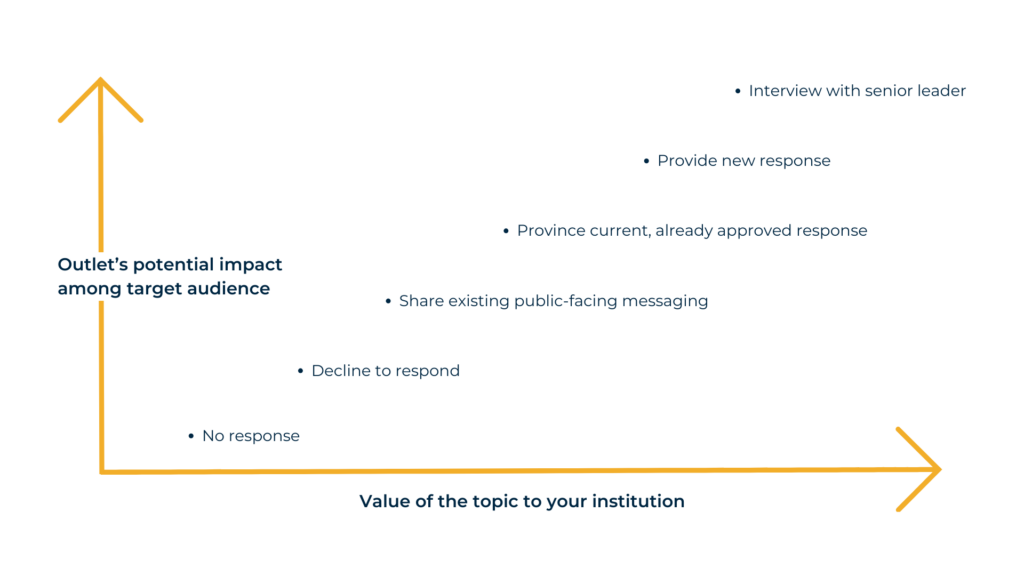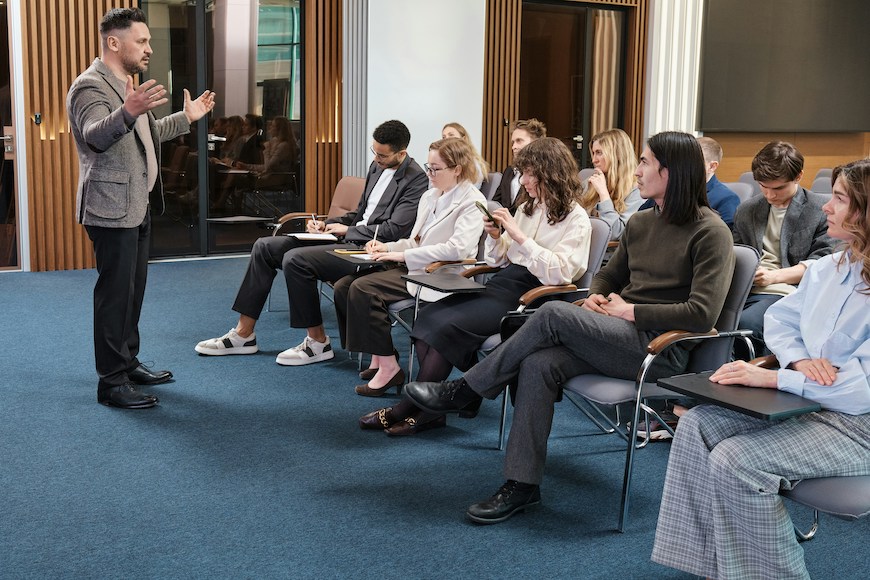Media Relations in Higher Education: Working With The Student Press
Most media relations teams at universities and other higher education institutions spend more time and energy dealing with the student press than any other media outlet.
We know this because our Broadsight Tracker data shows it. One leading Western Canadian university had 192 issue-related media enquiries in 2023, and 64 of them came from the student newsroom. That’s one-third of requests.

They might not be the most influential outlet you deal with, but the fact they take up so much of your time is reason enough to have a plan for managing their requests. Consider:
- When it comes to institutional matters, student journalists will dig where mainstream journalists won’t.
- Smart mainstream news outlets monitor the student press for story ideas, and can turn a student-driven story into national news.
- Student media’s influence is greatest with audiences that are important to your institution: students, faculty, and other members of the campus community.
- Student journalists are often quite inexperienced, which brings an extra element of risk to your engagement with them.
The relationship with student press is important and sometimes challenging, but doesn’t always get the strategic thought it deserves.
Here are tips we gathered from media relations professionals from universities and colleges across Canada who deal regularly with the student press.
Establish Internal Standards for Engagement
You’re going to get a lot of requests from student media.
Internally, establish criteria for which types of requests your office will accommodate. Focus on requests from established news outlets, including student media.
If a student request meets your criteria, assign it priority as you would any other media request. Consider the news outlet’s potential impact among your target audience, and the value of the topic to the university.

Try to limit your engagement to providing existing materials rather than a custom response each time. Don’t assume students have seen meeting minutes, policy pages, or other content buried on your institution’s website. Point them in the right direction. If you have existing messaging on their topic, use that.
A custom response may be warranted if any of the following apply:
- the request deals with critical student issues (e.g. health/wellness, sexual violence)
- you’re concerned about the potential for errors in the coverage
- the story could lead to wider media coverage of reputational concern to your institution
Get an Early Start on Relationship-Building
Student journalists and their leadership turn over regularly. Proactively reach out to leadership early in their tenure and meet with them.
Putting a face to your name makes it easier when you’re emailing back and forth. They know someone is actually taking their concerns seriously, even if you can’t provide an answer or details for their story.
When you meet, establish best practices for communication. Set clear expectations and outline your procedures for handling media requests. Define who requests should be directed to, response times, and how requests are prioritized.
“While you won’t always agree with each other, getting to know the editor and reporters on a professional basis will help when circumstances get rocky,” said the director of marketing and communications at a Western Canadian university. “You don’t want your first contact with an editor to be over a disputed story or a reporter’s conduct.”
Maintain Regular Communication
Keep lines of communication open through regular meetings and updates. This helps build trust and ensures that student journalists have the support they need when covering complex issues.
Don’t be afraid to call instead of emailing. It can be more effective, and it reminds students that institution staff are human beings, too.
“It’s important to have relationships that are established, so if hard conversations are necessary there is a firm foundation to build upon,” said one communications professional from a Western Canadian university. “For example, as a former newspaper editor I am providing some help on digitization of their product. I hope this builds goodwill and trust when an issue comes up, or there has been some unfair reporting.”
Include Them!
Student media should be on your media list for all news releases and advisories.
Share big institutional announcements with them under embargo if you are doing so with other media. Make sure they know how an embargo works and will respect it.
Invite them to on-campus events they might consider newsworthy, such as a strategic plan presentation or a student town hall meeting.
Don’t forget about them when responding to issues. It’s easy to get preoccupied with major media, but breaking news is of no less interest to students. This will strengthen your relationship with editors.
Provide Guidance and Support
Remember that these are students, honing their craft and learning. Try to be patient and understanding.

Some are more mature and have worked in professional settings, while others are straight out of high school. They might communicate in very different ways than you’re accustomed to. (😉)
“I offer the senior editors off-the-record background briefings on anything they care to ask about,” said the director of media relations at an Ontario university. “I sometimes offer them proactively to try to avert coverage I sense is going to be of poor quality, go down a bad tangent or require corrections. They don’t take advantage of this enough.”
Make Them Do The Work
You can give student journalists a little coaching, but don’t do their job for them. If the answers to their questions can be found on a web page or with a little bit of searching, let them know and send them back.
Encourage them to do background research and clarify questions before submitting interview requests. This not only improves the quality of their inquiries but also helps them understand the complexity of your institution’s operations.
Educate Them About Institutional Processes
Make sure students understand that your responses may require input from multiple stakeholders, and that’s why immediate answers aren’t always possible. Many student journalists have a misconception that institutional responses come only from the person to whom they’re attributed.
Respect Journalistic Integrity, Enforce Journalistic Standards
Understand and respect the independence of the student press. Open dialogues about the responsibilities and impacts of their work are crucial, but attempts to control or interfere are inappropriate.
Point out when journalistic standards, guidelines and ethics are not respected. You can point to guidelines from major journalism associations, so they know it’s not just you saying this.
Ask for corrections promptly, as many times as you need to.
Get to Know Their Instructors
If the student journalists represent the journalism program at your institution, it can be helpful to know their instructors, their background and what they expect from students covering campus topics.
“Our media relations staff were getting inundated with student journalists writing stories as an upper-year assignment with the intent to get published in the student newspaper. Many had unrealistic expectations about whom they could interview and when,” said a director of marketing and communications. “By meeting with the instructor and department head, we agreed on a process that included more story pitch vetting by the instructor, and we gave a guest lecture to explain how media relations works from ‘the other side.’”
Offer Professional Development
Offer to do a guest lecture on media relations and how your department works with journalists.
Offer to co-host workshops or panels to provide student journalists with skill development opportunities. This could be a panel or hands-on workshop that includes a colleague from another institution, or one of your journalist contacts. The topics could be anything from reporting on short deadlines, to ethical use of unnamed sources, to pitching stories to editors.
They’ll benefit from the training, but so will your institution.
Manage Requests Efficiently
Use shared documents or a system such as Broadsight Tracker to track media requests, manage workload, and communicate status updates efficiently. This helps you prioritize requests and ultimately helps student reporters meet their deadlines.
Broadsight Tracker can help your team track their media and issues-management work from start to finish, so you can stay organized, collaborate easily, and quickly generate analytics that demonstrate your value to the institution.
For a free demonstration, email info@broadsighttracker.ca.
Media relations professionals from across Canada contributed valuable input for this post, but some wished to remain anonymous. We thank them all for their tips.
Receive our newsletter
Sign up below and we’ll be in touch with monthly updates about Broadsight, along with news and insights to keep you on the cutting edge of communications work in an AI era.

